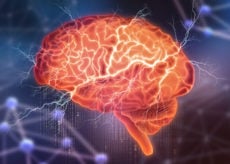See all the Effects of Stress on Your Bodily Systems

“I really wish my life were more stressful,” said no one ever. Yet stress affects everyone. It’s the body’s way of reacting to change—positive changes typically lead to positive stress, while negative changes can lead to negative stress and some pretty negative results. Regardless of what’s causing the stress, it’s important to understand the effects of stress and how the systems in the body react to it.
If you want to jump ahead, you can see the effects of stress on:
- The Nervous System
- The Immune System
- The Cardiovascular System
- The Digestive System
- The Muscular System
- The Integumentary System
- The Reproductive System
The Effects of Stress: Preparing for Fight or Flight
Stress begins in the head—in the control tower of the brain called the hypothalamus. It sends the signals (i.e., stress hormones like adrenaline and cortisol) to the rest of the body to fight or fly via the central nervous system (CNS).
These signals cause the heart to race, the breath to quicken, and the muscles to prepare for action. Your body is ready for the emergency! Bring on the dragons (or run from them…) Or, on the more positive end, bring on the new job, partner, or home. Your body is now ready to take on whatever life has thrown your way!
Great! That’s exactly how stress is supposed to work. It’s a healthy, natural response to everything from work and family stresses to positive events (such as a wedding or vacations to new lands) to tragic events (like the death of a loved one or an illness).
Stress can even provide health benefits like improved brain function, enhanced protection from infections, and increased resilience.
Unless, that is, your stress response is triggered over and over again (day after day, or worse, week after week, month after month). Either repeatedly or chronically.
You see, after the stressful event, your hypothalamus should tell all your systems to stand down, relax, and return to normal. An extended stress response, however, keeps your body at high alert with the stress hormones flowing. And all of this excitement within your body not only leaves you exhausted, but it could also put your health at serious risk as well.
Prolonged stress, for example, can cause:
- Anxiety
- Irritability
- Nervousness
- Fatigue
- Depression
- Insomnia
- Headaches
- Difficulty concentrating
- Confused thinking
- Overeating
- Undereating
- Substance abuse
- Social withdrawal
- Feeling helpless
- Breathing problems
- Increased blood pressure
- Increased risk of a heart attack and stroke
- Heartburn
- Lowered immunity
- An increased number of infections or illnesses
- Decreased sexual function and low sex drive
- Fertility problems
- Missed periods
- Stomach troubles
- Muscle tension
- Decreased self-esteem
Chronic stress can come from a demanding, high-pressure job; financial challenges; a chronic illness or injury (to yourself or a loved one); or difficulties in a relationship or the loss of a loved one. And, the stress can then affect every system in the body.
The Effects of Stress on the Brain and Nervous System
While short-term stress can actually improve brain function, chronic stress has been found to lead to a decrease in brain size as well as structural changes leading to decreased cognition and memory. High concentrations of stress hormones have been found to cause memory disorders.
Stress can also lead to anxiety, depression, lack of sleep, and decreased enthusiasm for activities you typically enjoy.
The Effects of Stress on the Immune System
Acute stress turns on the immune system to help the body avoid infections and help wounds heal more quickly, so you can focus on the battle at hand. But if that battle is never-ending (or seemingly so), the immune system can get burned out and weakened, decreasing the body’s ability to fight off infections and injury. This can lead people to become more susceptible to colds, flu, and other infections and then lead to slower recovery.
For people suffering from autoimmune conditions like lupus, inflammatory bowel disease, or multiple sclerosis, stress can make symptoms worse.
The Effect of Stress on the Cardiovascular System
When faced with stress, breathing becomes more rapid to deliver oxygen to the body faster. And your heart pumps harder and faster—again to get the oxygen into the muscles, so you’ll be ready to take action. This raises blood pressure. And, if you already have a breathing problem (like asthma), then you likely find it’s harder to breathe when you’re stressed. Worse, if stress is chronic or frequent, it can also increase this risk of heart disease, heart attack, or stroke.
If you’re experiencing extreme stress or intense emotions (like the loss of a loved one), you may even feel like you’re having a heart attack due to a condition called “broken heart syndrome.” This condition temporarily disrupts the heart’s normal pumping and can be really scary—it feels like a heart attack! If you experience anything like this, please seek immediate medical assistance as it is treatable.
The Effects of Stress on the Digestive System
When faced with stress, you need energy. Stat. The liver meets this need by producing extra blood sugar (i.e., glucose). But the body can’t handle these blood sugar surges indefinitely. That’s why chronic stress can increase the risk of type 2 diabetes.
In addition, the digestive system is also impacted by the rush of hormones. Chronic stress can lead to heartburn, acid reflux, and even cause ulcers to flare up due to an increase in stomach acid. It can also change how food moves through the body, explaining why you may experience stomachaches, nausea, gas, diarrhea, or constipation when you’re stressed. And it may lead to more complex conditions like irritable bowel syndrome.
You may also experience an increase of appetite, which can lead to weight gain, or a decrease of appetite, leading to fatigue if you aren’t getting enough fuel for your body. And if you’ve ever been stressed (who hasn’t?!), you probably noticed you don’t necessarily make the best decisions when it comes to food. If given a choice between cookies, donuts, chips, or, say, broccoli… Yeah, you’re probably not going to choose the broccoli on a stressful day.
The Effects of Stress on the Muscular System
Because stress activates the fight or flight reaction, preparing the body for action, it’s not surprising that the muscles throughout the body tense up. This not only prepares the body to fight or fly, but it also helps protect against injury. Once the threat is gone, however, the muscles can once again relax.
But chronic stress keeps the muscles tight, which can lead to headaches and body pains, especially in the back and shoulders. It can also make the jaw disorder TMJ worse from tight facial muscles.
Stress can also lower your threshold for pain, causing the muscles to be more sore. And it can also cause other conditions like arthritis or fibromyalgia to flare up.
To make matters worse, if you’re already feeling sore, you’re also more likely to skip exercising, which actually can make you more sore and more stressed.
The Effects of Stress on the Integumentary System
What’s the “integumentary system”? It consists of the skin, hair, and nails and is by far the largest organ in the body. And of course, it isn’t immune to the effects of chronic stress. Some conditions that can be made worse by stress include acne, eczema, rosacea, alopecia, or psoriasis.
Prolonged stress can also cause itching and even hives, increase sweating, and make your hair fall out. Oh, and if you accidentally get a cut or bruise, you can expect the wound to take longer to heal.
The Effects of Stress on the Reproductive System
If you’re exhausted by unrelenting stress, it’s pretty likely that sex is the last thing on your mind. And while short-term stress can increase levels of testosterone in men, long-term stress leads to a decrease, which can negatively affect sperm production and lead to sexual dysfunction and even impotence.
Women aren’t immune to the impact of chronic stress either. It can affect the menstrual cycle, causing more irregular, heavier, and more painful periods. And, stress can amplify the symptoms of menopause.
How to Manage the Effects of Stress on the Body
People respond to stress differently. And again, the right kind of stress (think short-term excitement) can be good and really beneficial to your health. So please don’t think all stress is bad. It’s a bit like goldilocks—you need just the right amount to thrive.
But if you are experiencing chronic stress, it’s time to take back control and decrease levels. Fortunately, there are numerous ways to help reduce the levels of stress, so you aren’t overwhelmed with prolonged stress:
- Connect with friends and family, who can provide emotional support
- Exercise regularly
- Take a walk
- Be mindful
- Build mental fortitude
- Be grateful
- Meditate
- Breathe deeply
- Try yoga
- Get outside
- Practice good sleep hygiene
- Improve self-care
- Enjoy a massage
- Eat mostly nutrient-dense whole foods
- Take care of your gut health
- Laugh often
- Try adaptogenic herbs
- Seek help (from a doctor, therapist, or counselor) when necessary






